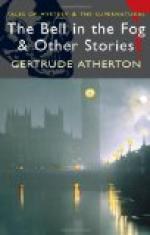The stage did not go to Santa Ursula, but a servant met him at a station twenty miles from home with a horse, and a cart for his trunk. He washed off the dust of three days’ travel in a neighboring creek, then jumped on his big gray mare, and started at a mild gallop for his ranch. He felt like singing his contentment with the world, for the morning was radiant, he was on one of the finest horses of the country, and he was as light of heart as a boy should be who has received a hint from fortune that he is one of the favorites. He looked forward to the social ordeal without apprehension, for by this time he had all the native American’s sense of independence, he had barely heard the word “gentleman” since his arrival in the new country, his education was all that could be desired, he was a landed proprietor, and intended to be a rich and successful man. No wonder he wanted to sing.
He had ridden some eight or ten miles, meeting no one in that great wilderness of early California, when he suddenly drew rein and listened. He was descending into a narrow canon on whose opposite slope the road continued to the interior; his way lay sharply to the south when he reached the narrow stream between the walls of the canon. The sound of many voices came over the hills opposite, and the voices were light, and young, and gay. John remembered that it was time for Dona Martina’s visitors to arrive, and guessed at once that he was about to fall in with one of the parties. The young Californians travelled on horseback in those days, thinking nothing of forty miles under a midsummer sun. John, who was the least self-conscious of mortals, was moved to gratitude that he wore a new suit of gray serge and had left the dust of stage travel in the creek.
The party appeared on the crest of the hill, and began the descent into the canon. John raised his cap, and the caballeros responded with a flourish of sombreros. It would be some moments before they could meet, and John was glad to stare at the brilliant picture they made. Life suddenly seemed unreal, unmodern to him. He forgot his olive-trees, and recalled the tales the priests had told him of the pleasures and magnificence of the Californian dons before the American occupation.
The caballeros were in silk, every one of them, and for variety of hue they would have put a June garden to the blush. Their linen and silver were dazzling, and the gold-colored coats of their horses seemed a reflection of the sun. These horses had silver tails and manes, and seemed invented for the brilliant creatures who rode them. The girls were less gorgeous than the caballeros, for they wore delicate flowered gowns, and a strip of silk about their heads instead of sombreros trimmed with silver eagles. But they filled John’s eye, and he forgot the caballeros. They had long black braids of hair and large dark eyes and white skins, and at that distance they all looked beautiful; but although John worshipped




